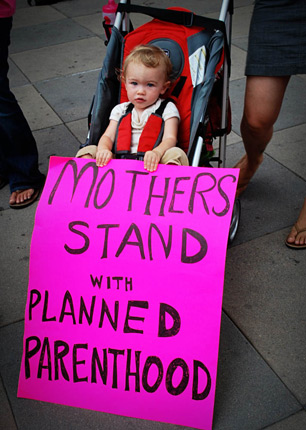As Texas prepares to launch its new state-funded Women’s Health Program on November 1st, the state’s top public health official announced yesterday that the Health and Human Services Commission has officially adopted rules banning abortion “affiliates” from participating in the WHP. The rules are intended to ban Planned Parenthood from participating in the program, despite the fact that the health care provider has historically provided care to more than half of the WHP’s enrollees in years past, and despite the fact that the program itself deals not at all with safe abortion care and is explicitly directed at women who are not, and do not want to be, pregnant.
HHSC Executive Commissioner Kyle Janek told reporters on Thursday that he was “confident” the state could find providers to fill the gap left by the exclusion of Planned Parenthood, but that he couldn’t “guarantee” that would happen on November 1st.
What Janek can guarantee is that the state will shut down the WHP entirely if the Planned Parenthood ban is found to be against the law, effectively holding hostage the care of the 115,000 Texans who rely on the WHP for pap smears and contraceptives. The adopted rules include a “poison pill” clause that would immediately shut down the Texas program if judges rule in favor of Planned Parenthood in their pending lawsuit against the state claiming the exclusion is unconstitutional.
“If the courts say you have to include Planned Parenthood, then yes, it goes away,” Janek told reporters.
CEO and President of Planned Parenthood Ken Lambrecht denounced the decision in a statement released Thursday, calling it “shocking” that the state would “rather end low-income women’s access to family planning and preventative health services altogether than allow Planned Parenthood to provide these vital health services to women who choose to come to Planned Parenthood for care.”
The affiliate ban comes despite pleas from health care professionals, university researchers, WHP enrollees and Planned Parenthood supporters who gave impassioned statements to the HHSC in a September meeting asking the department not to exclude abortion affiliates from the program. The HHSC did, however, make a concession to those who worried that language in the rules banning the “promotion” of abortion would prevent doctors from discussing the procedure at all with their patients.
“What we wanted was to allow for the one-on-one, private, non-directive counseling between a physician and her patient,” Janek said, acknowledging that the original language was “a bit of a gag rule.” Doctors will be allowed to provide information to patients about abortion providers, but can do little else.
Last month, the president of the Texas Medical Association, Dr. Michael Speer, asked HHSC not to “gag doctors” in a statement that said the rules would force them to choose between practicing good medicine or following “a rule created to serve a political ideology.” Though he has not yet had an opportunity to review the entirety of the new rules, Speer told RH Reality Check in a statement Friday that “physicians are encouraged” by the changes, because “it is very important that patients are able to trust that their doctor is giving the best medical advice for them—based on their medical needs and nothing else.”
In a 43-page document detailing the HHSC’s response to comments received on the affiliate rule—the vast majority of which asked the department not to adopt the rules—the HHSC appears confident that it can find a sufficient number of providers to address the needs of all 115,000 Texans in the program, though both George Washington University’s analysis and RH Reality Check’s own investigation have found evidence to the contrary.
In the document, DSHS acknowledges that “some women”—that’s the around 50,000 Texans who currently go to Planned Parenthood, more than half of the program’s enrollees—will have to switch providers, but that “women will find a new provider within a reasonable distance and geographic range” and that it cannot be asked to “estimate the indirect costs to the state of under-utilization of a state program” that would come from an increase in taxpayer-funded Medicaid births. GWU’s study, released last week, predicts that the exclusion of Planned Parenthood from the WHP will result in a “substantial increase in the number of unplanned pregnancies in Texas,” achieving precisely the opposite of the WHP’s stated goal, which is to help women who don’t want to be pregnant stay that way.
Texas Women’s Health Program Abortion Affiliate Rules
Texas Women’s Health Program Abortion Affiliate Rules
Media that fights fascism
Truthout is funded almost entirely by readers — that’s why we can speak truth to power and cut against the mainstream narrative. But independent journalists at Truthout face mounting political repression under Trump.
We rely on your support to survive McCarthyist censorship. Please make a tax-deductible one-time or monthly donation.
